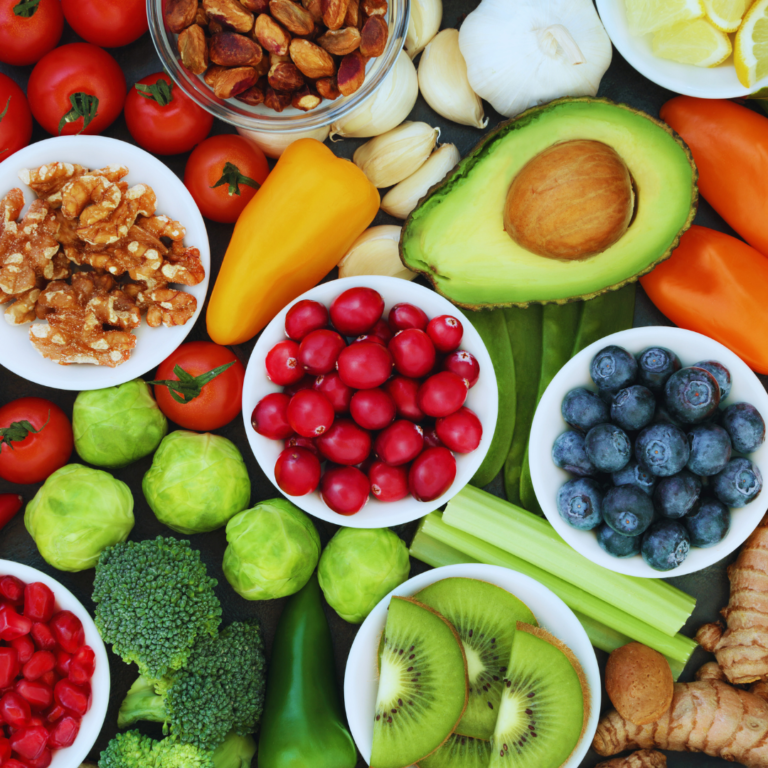
Incorporating superfoods into daily meals can significantly enhance overall nutrition and well-being. These nutrient-dense foods are packed with vitamins, minerals, and antioxidants that contribute to better health and can help prevent chronic diseases. With the right choices, anyone can boost their diet and energy levels with simple adjustments.
This article highlights five exceptional superfoods that offer a wealth of health benefits. From improving heart health to enhancing brain function, these foods provide practical ways to elevate one’s diet. Discovering how to easily integrate them into meals can lead to a healthier lifestyle.
The Role of Superfoods in Your Diet
Incorporating superfoods into a diet can enhance nutritional intake and promote overall health. These foods are packed with beneficial nutrients that can support various bodily functions and well-being.
Understanding Nutrients and Their Benefits
Superfoods are typically rich in vitamins, minerals, antioxidants, and other bioactive compounds. They provide essential nutrients that can help combat oxidative stress and reduce inflammation.
For example, berries are high in antioxidants, which protect cells from damage. Leafy greens are excellent sources of vitamins A, C, and K, contributing to immune function and bone health. Cruciferous vegetables like broccoli contain sulforaphane, known for its anti-cancer properties.
By focusing on these nutrient-rich foods, individuals can improve their health outcomes and support their body’s functions more effectively.
Balancing Macronutrients and Micronutrients
Superfoods can help achieve a balanced diet by offering a combination of macronutrients and micronutrients. Macronutrients include proteins, fats, and carbohydrates, while micronutrients encompass vitamins and minerals essential for numerous biological processes.
Foods like quinoa are complete sources of protein, providing all nine essential amino acids. Fatty fish, such as salmon, deliver healthy fats and a rich supply of omega-3 fatty acids, which support heart health and cognitive function.
Incorporating these superfoods ensures a well-rounded intake. It allows individuals to meet their dietary needs while reaping the health benefits associated with these nutrient-dense options.
Top Superfoods to Include in Your Meals
Incorporating nutrient-dense foods into daily meals can greatly enhance health. Focus on specific superfoods that provide essential vitamins, minerals, and antioxidants to support overall well-being.
The Power of Berries: Blueberries, Strawberries, and More
Berries are rich in antioxidants, particularly vitamin C and flavonoids. Blueberries, for instance, are known for their high levels of anthocyanins, which can help reduce inflammation and improve heart health. Strawberries are packed with fiber and potassium, contributing to digestive health and cardiovascular support.
Including a mix of berries in the diet can help boost immunity and may lower the risk of chronic conditions. They can be added to smoothies, oatmeal, or enjoyed as snacks. This colorful food group offers not only flavor but also numerous health benefits.
Leafy Greens: Kale, Spinach, and Other Dark Leafy Vegetables
Leafy greens like kale and spinach are powerhouse foods rich in vitamins A, C, and K, and essential minerals such as calcium and iron. Kale is particularly high in antioxidants and has been linked to improved heart health and lower cholesterol levels. Spinach provides a good source of magnesium and fiber, helping maintain digestive health.
A daily serving of these greens can enhance nutrient intake. They can be easily incorporated into salads, smoothies, or as cooked sides. Consuming a variety of leafy greens ensures a broad spectrum of nutrients.
The Benefits of Beans and Legumes: Chickpeas, Lentils, and Peas
Beans and legumes offer an excellent source of plant-based protein and fiber. Chickpeas are versatile and can be added to salads or blended into hummus for a nutritious dip. Lentils are particularly high in iron and can help reduce fatigue and lower cholesterol levels.
Including a variety of beans in meals, such as black beans or kidney beans, can further contribute to heart health and stable blood sugar levels. They are ideal for soups, stews, or as meat substitutes in various dishes.
Nuts and Seeds: Essential Fats and Oils
Nuts and seeds are rich in healthy fats, protein, and essential nutrients. Almonds and walnuts, for instance, provide omega-3 fatty acids, which are beneficial for heart health. Chia seeds and flaxseeds are excellent sources of fiber and offer anti-inflammatory properties.
Incorporating a handful of nuts or a tablespoon of seeds into meals can enhance flavor and nutritional quality. They can be used in salads, smoothies, or as snacks, providing energy and satiety.
Additional Superfoods: Avocado, Salmon, and Yogurt
Avocado offers healthy monounsaturated fats, potassium, and fiber, making it a great addition to meals. It supports heart health and aids in nutrient absorption. Salmon is an excellent source of protein and omega-3 fatty acids, which are crucial for brain health and reducing inflammation.
Yogurt, particularly Greek yogurt, is rich in probiotics, aiding in gut health. It also provides protein and calcium, essential for bone maintenance. These foods can be enjoyed in a variety of dishes, providing both taste and health benefits.
Lifestyle Benefits of Superfoods
Incorporating superfoods into daily diets can yield significant lifestyle benefits. These benefits encompass disease prevention, support for weight management, and enhancements in physical health and well-being.
Preventing Chronic Diseases
Superfoods can play a crucial role in preventing chronic diseases such as heart disease and diabetes. Rich in antioxidants, vitamins, and minerals, they help combat inflammation, which is a key player in many chronic conditions. For example, berries are known to reduce oxidative stress, while leafy greens can support heart health by lowering cholesterol levels.
Eating a variety of superfoods regularly can strengthen the immune system, leading to a lower risk of illness. Whole grains, nuts, and seeds provide essential nutrients that nourish the body and may reduce the likelihood of developing inflammatory conditions. As part of a balanced diet, superfoods contribute to long-term health.
Weight Management and Obesity Prevention
Superfoods are beneficial for weight management and obesity prevention due to their nutrient density and low calorie count. Foods like quinoa, chia seeds, and legumes offer high fiber content, promoting feelings of fullness and reducing overall calorie intake. This can assist individuals in maintaining a healthy weight.
Additionally, superfoods often have a low glycemic index, which helps regulate blood sugar levels. This regulation can decrease cravings and support weight loss efforts. Integrating these foods into meals not only fosters healthy eating habits but also encourages sustainable lifestyle changes for long-term benefits.
Enhancing Physical Health and Well-being
Incorporating superfoods can enhance physical health and well-being through improved energy levels and better nutritional balance. Foods rich in omega-3 fatty acids, such as flaxseeds and fatty fish, support brain health and cognitive function. Similarly, vitamin-rich superfoods, like sweet potatoes and spinach, can improve overall vitality.
Physical activity can also be enhanced with the right nutrition from superfoods. They provide essential nutrients needed for muscle recovery and endurance. Establishing a diet that includes these foods promotes a more active lifestyle, contributing to better physical health and longevity.
Incorporating Superfoods into Everyday Eating
Adding superfoods to one’s diet can enhance nutrition without requiring drastic changes. Simple recipes, strategic shopping, and smart replacements can help integrate these foods seamlessly into daily meals.
Simple Superfood Recipes and Ideas
Incorporating superfoods can be straightforward and enjoyable. Smoothies are an easy way to mix in ingredients like spinach, kale, or chia seeds. A simple recipe could include spinach, bananas, almond milk, and a tablespoon of chia seeds blended until smooth.
Another option is to create a quinoa salad. Combine cooked quinoa with black beans, bell peppers, and a squeeze of lime. This dish not only incorporates superfoods but also offers a palette of flavors and textures.
For a quick snack, roasted chickpeas seasoned with spices can provide a crunchy, nutritious option. These recipes are approachable and lend themselves to creativity.
Shopping and Meal Planning Tips
When shopping for superfoods, it helps to focus on the produce section. Fresh fruits and vegetables should take priority. Look for seasonal produce to ensure quality and flavor.
Whole grains like brown rice and quinoa can often be found in bulk, reducing costs. When planning meals, it can be beneficial to prepare a weekly menu incorporating different superfoods. Dedicate a day to batch cooking grains or legumes.
Lastly, utilize grocery lists to avoid impulse buys, ensuring that healthier options are prioritized. This reduces the likelihood of purchasing less healthy alternatives.
Replacing Less Healthy Options
Making simple substitutions can significantly improve one’s diet. For instance, swapping white rice for quinoa can boost protein and fiber intake. Quinoa is a complete protein, making it an excellent choice.
Another substitution could be using Greek yogurt instead of sour cream in recipes. Greek yogurt adds creaminess while enhancing protein content.
In baked goods, using applesauce or mashed bananas in place of oil can reduce fat while maintaining moisture. These adjustments help maintain flavor while increasing nutritional value, supporting healthier eating habits.
